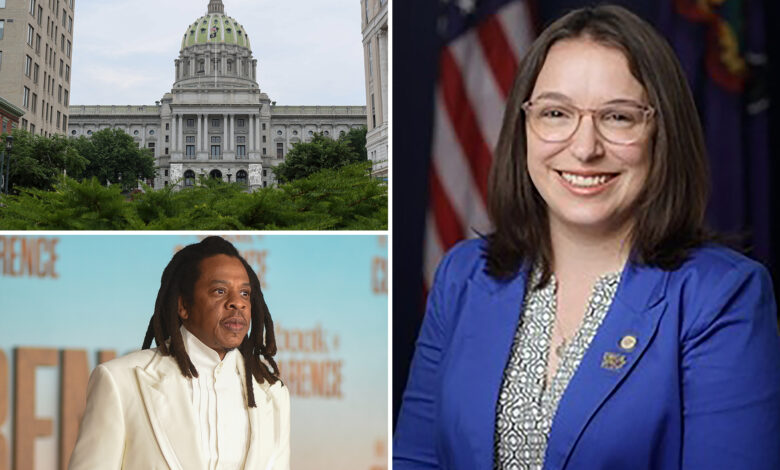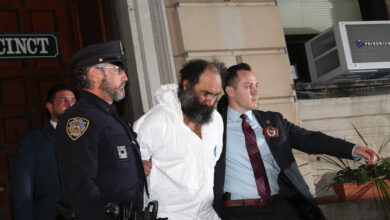Democrats’ school-choice lies laid bare in Pennsylvania — with black voucher support above 90%

Surrounded by dozens of teachers-union officials on the steps of the Pennsylvania state Capitol this month, Democratic state Sen. Lindsey Williams excoriated a proposed K-12 education-voucher program.
She called it a conspiracy by racist, religious fundamentalists bent on destroying public education by driving “straight, white, able-bodied kids into private religious schools.”
The next day, a group of black religious leaders gathered in the state Capitol to tell Gov. Josh Shapiro to support the voucher program, called the Pennsylvania Award for Student Success.
And later that same day, Jay-Z announced he will fund a campaign to mobilize support for the legislation in Philadelphia, where voucher support among black residents stands above 90%.
One is left to make one of three conclusions: Jay-Z, Black Pastors United for Education and the vast majority of black Pennsylvania residents are secret white supremacists; they’re being unwittingly controlled by white supremacists; or Sen. Williams is not telling the truth.
That last one is, of course, the sole option based in reality. But when it comes to education, truth is of increasingly little consequence to many Democrats.
If Williams’ voucher comments weren’t enough proof of that, then the shocking public-education funding proposal Pennsylvania House Democrats passed should be.
The state’s budget deadline is this Sunday.
The plan would put state taxpayers on the hook for an additional $6 billion per year within seven years, an 39% increase in state-level funding. It would also drastically cut funding for cyber charter schools — a popular choice for families since the pandemic.
Democrats present three primary arguments for this massive transfer of Pennsylvanians’ wealth to the education bureaucracy: Public schools are chronically underfunded, their proposal will alleviate the high property taxes afflicting many Pennsylvania communities, and a 2023 court case legally mandated their proposal.
“For too long, the state has failed to properly fund our public schools, and who shoulders that burden?” said Democratic House Majority Leader Matt Bradford in a floor debate.
“The school districts that are forced to have taxpayers make up the difference at the local level.”
Each of these arguments is false.
Pennsylvania’s average per-student public-education funding reached $22,000 in 2023, largely due to a 53.8% increase in state-level funding over the last decade.
That makes the average four-year high-school degree nearly $2,500 per year more expensive than in-state tuition for a four-year college degree at Penn State University.
Any claim that there isn’t ample taxpayer money in the public-education system’s many coffers is fictitious.
The Democrats’ proposal also does nothing to solve the problem of high property taxes. It instead subsidizes the problem by distributing the funding increase through “adequacy” and “equity” supplements for low-performing districts and districts that have high-tax rates on areas with low home values, respectively.
Unfortunately for local taxpayers, the bill does not require that districts lower property taxes despite these state supplements.
Nor does it prohibit them from raising taxes further.
In fact, it changes nothing about property-tax law in the state.
So not only will the high property-tax rates Bradford decried likely remain or even increase, but this exorbitant state education budget would also quicken the already-draining state budget surplus, likely necessitating state-level tax hikes.
Democrats nonetheless persist by arguing that their proposal is required by law.
They point to a Commonwealth Court ruling that the inequitable property-tax funding system violates the state Constitution’s education clause.
Again, this is dishonest.
While the court did rule the property-tax funding scheme violates the Constitution by creating an unequal “opportunity to learn” for some students based on location, the judge remained conspicuously vague on solutions.
Myriad reforms could address the property-tax system’s failures, and the court by no means dictated the state spend billions more per year.
The judge even said the solutions “need not be uniform” and the “options for reform are virtually limitless.”
Opposition to school-choice legislation and public-school spending-hike proposals by union-backed Democrats are typical politics — even Pennsylvania’s popular Democratic Gov. Josh Shapiro couldn’t, or wouldn’t, overcome the status quo in a battle over vouchers last year.
But for many Democrats, the education debate has transformed into zealotry. And in Pennsylvania, it’s evident that fiction is key to their pursuit to maximize the government education bureaucracy.
Michael Torres is deputy editor at RealClearPennsylvania. He writes about politics and policy issues, with a focus on education and identity politics.
Twitter: @mindoftorres




